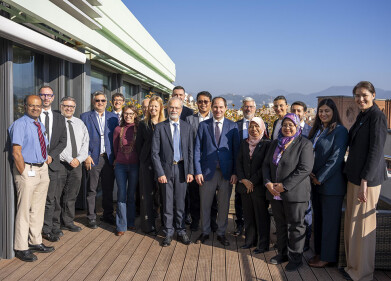Air clean up
Will Mexico’s Car Bans Measures Really Fight Pollution?
Apr 29 2016
As one of the largest cities in the world by population, it’s little surprise that Mexico City suffers from its fair share of air quality problems. Its location in the heart of the Valley of Mexico does little to alleviate these issues, since the mountains on all sides prevent the wind from dispersing pollution and keep a thin layer of smog over the inhabitants of the city.
In a bid to improve these dangerously poor air quality levels, the government introduced a “no circulation” policy at the beginning of the month. From Tuesday 5th April, the metropolitan area has banned all privately owned vehicles from taking to the streets for one day each week, and an additional Saturday every month. But will the measure be effective?
What the Policy Consists Of
The “non-circulation” scheme is not the first of its kind. Mexico City has long endured a torrid time with relation to air pollution, with the metropolis regularly reaching several hundred parts-per-billion in terms of pollution during the midday heat, which can severely obscure vision and cause or exacerbate existing respiratory conditions. Indeed, a 2004 study conducted in the city suggested that air pollution could even cause brain damage.
In response, the Mexican government have been employing counteractive measures since the 1980s. One such initiative involved restricting road access for vehicles whose number plate ended in a specific digit on certain days of the week, similar to a scheme that was trialled in India at the beginning of the year.
As yet, policies such as these have enjoyed limited success around the globe. Why?
Problems with the Policy
With regards to the number-plated scheme, the incentive hasn’t always had the desired effect of encouraging the use of public transport, which suffers from ill-repute of danger and discomfort in many parts of the world. Instead, wealthy commuters simply circumnavigated the ruling by purchasing another car with a different number plate or took a taxi to their destination.
As such, the scheme might have even worsened air quality in some areas. It certainly took its toll in a financial sense, according to Lucas Davis, a scientist at UC Berkeley in the States. “I just think that once people become drivers in Mexico City they don't go back,” Davis explained. “A rough calculation suggest these costs amount to over $300 million per year, or $130 per vehicle owner.”
Furthermore, previous policies also contained exemptions for vehicles which passed smog regulations. Unfortunately, unscrupulous mechanics have been known to fake certifications on polluting cars in exchange for a cash sum, meaning the policies have been ineffective.
How This Policy Differs
Such corruption should not be possible with the new scheme, since no exemptions are to be made for any cars. Similarly, commuters will not be able to get around the ruling by buying another vehicle due to the fact that ALL privately owned vehicles are to be forced off the road once a week.
The scheme is set to continue until mid-June, when the commencement of the rainy season is expected to alleviate pollution in the capital. The policy comprises part of a wider plan to challenge poor air quality, including targeting 35% of energy production from renewables by 2024, reducing smog alert thresholds and introducing more sophisticated technology at smog test centres.
As of now, it’s impossible to say whether the car ban and the other incentives will succeed in fighting pollution – but at least they are a step in the right direction.
Events
Carrefour des Gestions Locales de L'eau
Jan 22 2025 Rennes, France
Jan 29 2025 Tokyo, Japan
Feb 05 2025 Nantes, France
Feb 16 2025 Kampala, Uganda
Feb 26 2025 Chennai, India










